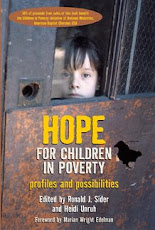When I write the words, "children in poverty," a slideshow of children's faces comes to mind.
One is a beautiful infant with kissably chubby brown cheeks, liquid eyes and a soft fringe of hair. Members of her family are rumored to be drug dealers. She is named after her mother's favorite alcoholic drink. Born to a single mother, granddaughter of a single mother, the statistics governing her destiny are stark, the odds of her escaping another go-round on the descending spiral of fatherless generational poverty all too slim.
Another face belongs to a ruddy, pudgy boy, just having reached the magical birthday when he gets to add "teen" to his age. A placid expression and slow speech denote his borderline IQ. Under heavy medication for ADHD, he alternates unpredictably between hyperactivity and vacant passivity. But when a friend comes within a few feet he springs into action, with a huge bear hug and huger sloppy grin. His father is in prison, his mother recently died of the health complications that often accompany a hard-lived life. According to all research, the path before him leads, statistically speaking, to his father's locked-down doorstep. I can only pray that he finds a detour.
I see the impish face of a first-grader, showing off her new pair of pink shoes from Wal-Mart. She loves candy, furry animals and anything that involves going fast. Her parents are married, employed homeowners who stay home when their childless friends are out partying. But with minimal education, their jobs pay little above minimum wage, with few prospects for advancement. If not for her parents' being savvy about available benefits – EITC, free school lunches, state-sponsored child health care, home repair assistance programs – my little friend's life would be far more of a struggle. For now, being poor doesn't enter her conscious world, except that it means she can't have a pony.
The fourth face looks out at me from a Compassion photo. He lives in Brazil, in a family struggling to keep every mouth fed. He is about the same age as my son, who was delighted to discover that his new Brazilian friend also likes race cars. We will probably never meet, but at least I know that he will get to eat every day, wear clothes that fit and receive an education — gifts that the three other children in my slideshow will probably take for granted.
What faces come to your mind?
How is our response to "children in poverty" conditioned by the faces we see—and by the faces we never see?
If you don't hold the face of a child in poverty in your heart … perhaps one of the first steps you can take on this journey is to get to know a poor child.
In fact, since one out of six children in this country are poor, it's likely that you already know such a child; you just don't know that they are poor. And that's a not a bad thing. Because first and foremost, children in poverty are simply children. The core essence of their life is not their financial status or their risk factors or statistical life outcomes.
The essence of a child looks out at us through those beautiful, God-stamped faces.
Monday, August 4, 2008
Subscribe to:
Post Comments (Atom)

No comments:
Post a Comment